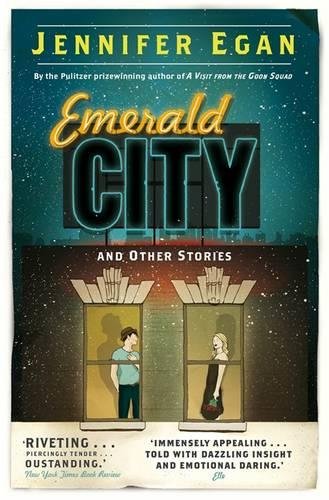
(Image © David, 2008)
*
In this essay, shortlisted for the 2017 THRESHOLDS International Short Fiction Feature Writing Competition, Morgan Omotoye is reminded of the power of the short story in Jennifer Egan’s ‘Why China?’.
~
Comments from the judging panel:
‘I wanted to applaud as the author explained how great short stories makes us far more than the sum of our own biographies. There’s wonderful passion here for what a short story can do, and that passion powers this piece along. The discussion is delivered with honesty and the poignant simplicity of one short story lover speaking to another and saying, ‘Read this.’’
‘This made me want to read Jennifer Egan’s work.’
‘I loved the quotation from Milosz at the end.’
‘The author leaves us with a sense of short fiction’s power to summon the extraordinary-ordinary.’
~
 Morgan Omotoye grew up on Earth. Various attempts to leave – due to a perennial bad attitude – for the scintillating rings of Saturn have been thwarted; thus far, by shenanigans. Such as: binge watching TV box sets, gaining a Creative and Life Writing MA from Goldsmiths University, and somehow losing it. Morgan’s writing has appeared in Staple New Writing, Litro, Open Pen and Thresholds. All things being equal, as we speak, Morgan is off someplace writing or staring distractedly into space. If you happen to see him before I do, tell him he owes me £8.72 for this bio.
Morgan Omotoye grew up on Earth. Various attempts to leave – due to a perennial bad attitude – for the scintillating rings of Saturn have been thwarted; thus far, by shenanigans. Such as: binge watching TV box sets, gaining a Creative and Life Writing MA from Goldsmiths University, and somehow losing it. Morgan’s writing has appeared in Staple New Writing, Litro, Open Pen and Thresholds. All things being equal, as we speak, Morgan is off someplace writing or staring distractedly into space. If you happen to see him before I do, tell him he owes me £8.72 for this bio.
~
DON’T YOU?
by MORGAN OMOTOYE
Love and heartbreak tend to go arm in arm, and, make no mistake, I’m madly in love with ‘Why China?’, Jennifer Egan’s opening short story in her masterful collection, Emerald City. Perhaps my affection for this story has something to do with the fact that I taught English in China for a year? Could this, its exotic, far-flung location, be its draw?
In a conversation for The New York Times with sensational short story writer, novelist, essayist and all-round super-awesome nice guy George Saunders, Jennifer Egan noted:
It’s interesting that your entry point to fiction is language, mine is always place. I tend to have that before I have the people or even the language.
I recognise the China Egan writes about: teeming crowds, the alarming but charming celebrity status of being a foreigner, legion of bicycles every which way you look, but, hand on heart, I don’t believe this is the reason I’m captivated by the story.
Perhaps my obsession has something to do with its stylistic elements, the fact that the title is a question, and that the first line of the story is an answer: ‘It was him, no question.’
These, the very first words in ‘Why China?’ belong to Sam Lafferty, a stock trader who has taken his family on vacation to China while being investigated for ‘messing with the numbers’, back home in America.
What is interesting to note here is the fact that nearly every character in Egan’s story has questions, from Sam’s wife, Caroline (‘Since when are we a Chinese family, Sam?’), to their daughters, Melissa and Kylie (‘Daddy, why?’), to even a colleague, Harry Myers (‘Cameron Who? My party?’). Sam, in a sense, is being interrogated by everyone he knows.
This stylistic quirk, serves to make us hyper aware that the only characters in ‘Why China?’ not introduced by questioning Sam, are Sam himself and a gentleman he recognises in an ‘outdoor market’ – a person we later discover is the ‘cocksucker’ who ‘ripped’ Sam off.
Moreover, this questioning from nearly all the characters in the story invariably makes us wonder if Sam is guilty of the financial impropriety he is accused of. We also ask ourselves why Sam, after seeing and interacting with the man who cheated him out of $2,500, decides to follow him, with his family in tow, a turn of events which gives the story a Hitchcockian whiff, a cat and mouse ambience.
interacting with the man who cheated him out of $2,500, decides to follow him, with his family in tow, a turn of events which gives the story a Hitchcockian whiff, a cat and mouse ambience.
The person Sam sees in the outdoor market is named Stuart Peale, but when Sam first met him his name was Cameron Pierce – a man whom Sam considered, ‘The sort of New Yorker we San Franciscans are slightly in awe of’. Crucially, Stuart appears not to recognise Sam, and more intriguingly Sam chooses not to reveal himself. ‘He was a crook – I knew it, but he had no idea I knew. I enjoyed having this over him; it almost made up for the twenty-five grand he’d conned me out of.’
Egan’s superlative use of questions, to flesh out the narrative and reveal character, is ingenious. It permeates the story, and, once noticed, not only becomes part of the complex machinery which keeps the story humming along, but also serves as a source of humour – the way repetition in a song or joke can be funny.
From the onset, limned by the questions of others, Sam Lafferty is also defined by wealth. He is a stock trader, and it is no happy accident he sees Cameron in an outdoor market, a place of trade and commerce. It also appears Sam is slightly embarrassed about his wealth:
Caroline and the girls and I took taxis, which could mean anything from an automobile to a cart being pulled by some thin sweating guy on a bicycle. It pissed me off that the four of us couldn’t ride bikes together like a Chinese family.
He finds himself reminiscing more and more about the time he spent in Kenya-with Caroline – as part of the Peace Corps helping the Masai ‘repair their houses made of cow dung’. He is nostalgic for his past. ‘I always liked remembering that time, knowing the money and houses and trips we’d gotten our hands on since then hadn’t washed it all away.’
Wealth, the trappings of wealth and its pursuit is altering the timbre of his relationship with his family. While Sam is investigated, Caroline, a sculptor, has had to support him, which Sam sees as fair game since he has ‘worked his ass off at the office for years while she puttered away in her sculpture studio’. Sam notes, Caroline ‘owed’ him, and this was not a ‘feeling he minded’. Wealth is also affecting his relationship with his young daughters:
Blond, expensive looking creatures whose soft skin and upturned noses I used to take credit in, wrongly, I know, for having procured for them at great cost, as I had their orthodontically perfect smiles.
Sam has begun to lavish more attention on his youngest daughter, Kylie, while ignoring twelve-year-old Melissa who, ‘the world seemed to agree was fractionally more lovely’, and thus his campaign against her – pretending to fall asleep during her figure-skating competitions, excluding her from trips to the zoo with Kylie – is his way of ‘evening up the balance’.
I am sure you have not failed to notice certain pecuniary terms in Sam’s choice of words, such as ‘owe’, ‘balance’, ‘fractionally’, ‘credit’, ‘expensive’; this shows just how much wealth has infiltrated Sam’s life. So it’s no surprise when its loss unbalances him. ‘It wasn’t depression, exactly; more a weird, restless pressure that made me wander the house late at night…’
Why is money, wealth, so important to Sam? Why has it come to define him? We learn Sam was poor as a child, that his father was ‘luckless’. Earlier in the story, while purchasing train tickets to Chengdu Province, Sam notes the corridor he walks down has ‘that smudged, institutional feel of the public schools I’d attended as a kid and made sure my daughters would never go to’.
Sam’s pursuit of wealth is not for himself, but his family, to ensure they don’t endure the poverty he experienced growing up. Having been duped, he has begun to question the cost of all his hard work, to resent his family, their sense of privilege, and, above all, his daughters.
I’d find myself staring at my daughters accusingly, awaiting some acknowledgement from them of the brutal disparity between the Masai kids’ lives and their own. Instead I found in their beauty a righteousness that galled me.
 When Sam is conned by Cameron Pierce at Harry Meyer’s stag party, it is important to note, he tells him about his time serving with the Peace Corps, ‘something I rarely mentioned to people in the business’. Sam also describes Cameron as ‘having more cowboy in him than the rest of us’. And it is this outlaw appearance, the fact that Cameron appears to hail from another world, one more real than the one Sam inhabits, that tempts him. In case we miss this point, there is a red apple present in the scene, which Cameron ‘was eating with a fierce pleasure that made me want one too’. This seduction, takes place at a ‘stag party’ typically held to be the groom’s last night of freedom before wedlock. For Sam the business opportunity Cameron offers is possibly the last opportunity for him to do something wild, to break free from the restraint of fiscal and familial responsibility, to be young again, and to act on ‘pure gut’.
When Sam is conned by Cameron Pierce at Harry Meyer’s stag party, it is important to note, he tells him about his time serving with the Peace Corps, ‘something I rarely mentioned to people in the business’. Sam also describes Cameron as ‘having more cowboy in him than the rest of us’. And it is this outlaw appearance, the fact that Cameron appears to hail from another world, one more real than the one Sam inhabits, that tempts him. In case we miss this point, there is a red apple present in the scene, which Cameron ‘was eating with a fierce pleasure that made me want one too’. This seduction, takes place at a ‘stag party’ typically held to be the groom’s last night of freedom before wedlock. For Sam the business opportunity Cameron offers is possibly the last opportunity for him to do something wild, to break free from the restraint of fiscal and familial responsibility, to be young again, and to act on ‘pure gut’.
Sam is seduced by what Cameron appears to stand for, what he offers, and when Cameron Pierce/Stuart Peale runs off with his money, Sam is devastated. He is heart broken. He has confessed something important about himself to Cameron, his time in the Peace Corps, and even with this revelation, Cameron deceives him. Sam becomes obsessed with wondering who Cameron really is: ‘Was he anyone?’ he asks himself.
When he bumps into Cameron in China, Sam pursues him, heedless of the effect this might have on his family. It is almost as if Stuart/Cameron has become Sam’s doppelganger, living the life Sam thinks he wants to live, one without financial or familial responsibility. Remember the evocative title of the collection is Emerald City, the magical destination Dorothy and her merry band make their ways towards in The Wizard of OZ, hoping to find, what they already have. What is it Sam will discover about himself at the end of the story?
When I first read ‘Why China?’ I believed Sam Lafferty was my favourite character and the reason the story fascinated me. There was something in his admission – ‘It’s my daughters, they’ve done me in. Drained me dry’ – I thought colossally unfair, scary, but also crushingly honest. However, as I read the story again, again and again, I found myself growing more intrigued by Melissa.
I found myself rooting for her, especially in light of how unfairly she is treated by her father. I was amazed at how, under duress, she bears it all, and is not mean or cruel to her younger sister. I realised, that Sam, for all the vainglorious pride he takes in recognising Stuart Peale, cannot ‘see’ his daughter; cannot see what he already has: a family that loves him.
‘When she finally turned back around, I stared at her, amazed, that a twelve-year-old girl could hold so much sadness in her face.’ I think this is the point at which my growing admiration for Melissa developed.
I have known that sadness, as a kid, and there’s something about its openness, unadorned and revealed to the world, seeking nothing but its own duration, which is truly courageous. It is this capacity for having your heart broken and still loving the world, that appealed and made me empathise with a twelve-year-old girl. I also imagine Melissa revealed herself to Jennifer Egan as the real heroine and beating heart of ‘Why China?’ – so it makes sense the devastating final words of the story belong to her: ‘He was nice.’
The Polish poet Czeslaw Milosoz wrote: ‘The purpose of poetry is to remind us how difficult it is to remain just one person.’ While reading ‘Why China?’ I was a sad-sack stock trader, a sculptor, a globe trotting criminal, an ‘Asian woman in a collegiate headband’ and a twelve-year-old girl. Egan’s skill lies in presenting the immediacy of these lives in moments of duress and transformation. While I read there were no walls, no borders, no barriers between what these characters made me feel and think. I was me and also not only me while I read ‘Why China? So read Emerald City by Jennifer Egan. It’s crazy amazing. Read widely, read more. Have your heart broken by what you read; fall in love with what you read. Be open, brave, and kind hearted like Melissa Lafferty. ‘The purpose of poetry is to remind us how difficult it is to remain one person.’ I think this also goes for the short stories we fall in love with, don’t you?
~
photo of Jennifer Egan © Pieter M. Van Hattem/Vistalux

